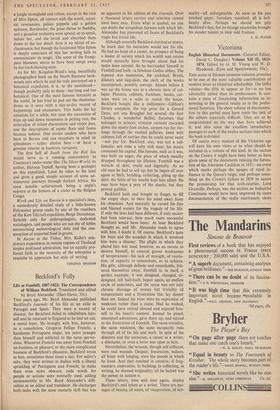Beckford's Folly
Life at Fonthill, 1807-1822: The Correspondence of William Beckford. Translated and edited by Boyd Alexander. (Hart-Davis, 35s.) Two years ago, Mr. Boyd Alexander published Beckford's Journals of his life as an exile in Portugal and Spain. They were a record of disaster, for Beckford failed to rehabilitate him- self and he returned to England as he had set out, a moral leper. He brought with him, however, as a consolation, Gregorio Fellipe Franchi, a handsome Portuguese singer, ten years younger than himself and addicted to the same perver- sions. Whenever Franchi was away from Fonthill on business, or pleasure, or the more complicated business of Beckford's pleasures, Beckford wrote to him, sometimes three times a day. For safety's sake, they were written in Italian with a liberal sprinkling of Portuguese and French; to make them even more obscure, code words for people or actions were normally used, adding immeasurably to Mr. Boyd Alexander's diffi- culties as an editor and translator. He discharges both tasks with the same masterly skill that was so apparent in his edition of the Journals. Over a thousand letters survive and selection cannot have been easy. From what is quoted, no one can doubt the scrupulous fairness with which Mr. Alexander has presented all facets of Beckford's tragic but trivial life.
Although naturally Beckford clutched at straws, he knew that his ostracism would last his life. He had no hope of a career, no prospect of being a leader of society which his wealth and estates would naturally have brought about had his tastes been normal. So he barricaded himself in Fonthill and built—a fabulous Gothic abbey. The expense was monstrous, the architect, Wyatt, dilatory and slap-dash, the clerk of the works incompetent, possibly corrupt. Almost before it was up the house was in a chronic state of col- lapse. Pictures, cabinets, furniture, books, cur- tains were on a scale to match the house. Beckford bought like a millionaire—Gibbon's library complete, the top price for a Gerard Drou, not one Brueghel but several, the best Claudes, a wonderful Bellini, furniture that belonged to princes; crimson curtains cascaded down the ninety-foot arches, carpets ran for fur- longs through the vaulted galleries, lined with cabinets full of rarities that he could never resist —nor pay for. Beckford, alas, was not a mil- lionaire, not even a very rich man; his mania consumed his capital. His fortune, such as it was, was built on sugar, the price of which steadily dropped throughout his lifetime. Fonthill was a miracle of debt, credit and ingenuity. As an old man he had to sell up, but he began all over again at Bath, building, collecting, piling up the debt; the fable of his wealth kept him afloat. He may have been a prey of the sharks, but they proved gullible.
Beckford built and bought to forget, to fill the empty days; to twist his mind away from his obsession. And naturally he cursed his fate and blamed society for the tragedy of his life. If only the laws had been different, •if only society had been tolerant, how much more successful Beckford would have been! At least Beckford thought so, and Mr. Alexander tends to agree with him. I doubt it. Of course, Beckford's taste for boys and the scandals in which it involved him were a disaster. The plight in which they placed him was used, however, as an excuse to deceive himself, to conceal graver weaknesses of temperament—his lack of strength, of resolu- tion, of capacity to concentrate, or to achieve. His gifts, although definite and remarkable, frit- tered themselves away. Fonthill is, in itself, a perfect example; • it was designed, changed, re- designed, left half-built, begun again, an endless circle of indecision, and the cause was not only chronic shortage of money but triviality of temperament and a frustration that lay deeper than sex. Indeed his vices were an expression of weakness rather than a cause. Had he wished, he could have retired abroad and enjoyed him- self to his heart's content. Instead he pined, attempted adventures, gave them up, and retired to the frustration of Fonthill. The same triviality, the same weakness, the same incapacity runs through all of his life and work. In spite of the disasters and the ostracism, a career as a writer, a dilettante, or even a lover was open to him.
Nevertheless, the wounds, though self-inflicted, were real wounds. Despair, frustration, tedium, all bitter with longing, were the moods in which he lived. And they resulted in creative, if frag- mentary, expression. In building, in collecting, in writing, he showed originality; all he lacked was the power to sustain it.
These letters, time and time again, display Beckford's real talent as a writer. There are pas- sages of beauty, of satire, of vituperation, of sen- suality—all unforgettable. As soon as his pen touched paper, boredom vanished; all is bril- liantly alive. Perhaps we should not pity Beckford's fate, for its strange necessities brought his slender talents to their odd fruition.
3. H. PLUMB










































 Previous page
Previous page